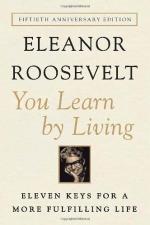
|
| Name: _________________________ | Period: ___________________ |
This test consists of 15 multiple choice questions and 5 short answer questions.
Multiple Choice Questions
1. What does Miss Hickok do to cope with her own personal health disaster?
(a) she learns a new language
(b) she creates art for children
(c) she writes children's stories
(d) she starts a volunteer organization
2. What must parents know about their children that will help their children dismantle their own fears and inhibitions?
(a) parents must know when children are ready to chose for themselves
(b) parents must know when children are ready to discipline themselves
(c) parents must know when children are ready to make ethical decisions
(d) parents must know when children are ready to become independent
3. What does Eleanor Roosevelt think mankind should do with those who are ready to retire?
(a) mankind should provide sustainable living for retirees
(b) mankind should allow more volunteer work
(c) mankind should provide health care for retirees
(d) mankind should use their experienced people
4. What else do people need in conjunction with a book education?
(a) people need to experience the kinesthetics of an event to fully understand
(b) people need the stimulus of the exchanging of ideas with others
(c) people need the stimulus of a heirarchy to climb
(d) people need to see examples for themselves
5. Where does courage sometimes come from?
(a) undeniable loneliness and hardship
(b) sheer exhaustion and abandonment
(c) sheer desperation in having to face the inevitable
(d) sheer exasperation at the event that has occurred
6. What do the people want to learn from Eleanor Roosevelt?
(a) The people want to learn what Eleanor Roosevelt has learned in her own lifetime.
(b) The people want to learn how to be Presidential
(c) The people want to learn how to life a bold life
(d) The people want to learn what it is like to be political and diplomatic
7. According to Eleanor Roosevelt, what is self-knowledge mainly about?
(a) learning one's fears
(b) learning one's desires
(c) learning one's weaknesses
(d) learning one's inner strengths
8. What is every individual responsible for?
(a) his or her philosophies
(b) his or her choices
(c) his or her actions
(d) his or her thoughts
9. What kinds of experience must people learn from?
(a) all of their experiences
(b) personal experiences
(c) professional experiences
(d) marital and family experiences
10. How do unhappy people treat their time?
(a) unhappy people use their time for pleasure
(b) unhappy people feel a sense of guilt about their time
(c) unhappy people have no idea what to do with their time
(d) unhappy people give their time away to other's discretion
11. What does Eleanor Roosevelt offer to her readers instead of answers?
(a) results
(b) challenges
(c) suggestions
(d) implications
12. What is Eleanor Roosevelt's aunt, Mrs. Cowles, more unique than most adults?
(a) she's sure of herself
(b) she's privleged
(c) she's deaf
(d) she listens
13. What are the best years of a women's life?
(a) it depends on when a woman finds her true calling
(b) it varies by the individual
(c) a woman who is raising children
(d) a woman who is about to marry
14. What does Eleanor Roosevelt claim she does not have in regards to life and living?
(a) coping skills
(b) all the answers
(c) happiness
(d) prestige
15. What type of book is "You Learn By Living"?
(a) an educational book
(b) a historical narrative
(c) a novel
(d) an inspirational book
Short Answer Questions
1. What conversational game does Ruth Bryan Rohde explain to Eleanor Roosevelt?
2. What do many people fear in regards to the world at large?
3. What does Eleanor Roosevelt say is necessary to accept in others?
4. What are the three environments in which people obtain their education?
5. What does self-knowledge require?
|
This section contains 632 words (approx. 3 pages at 300 words per page) |

|




